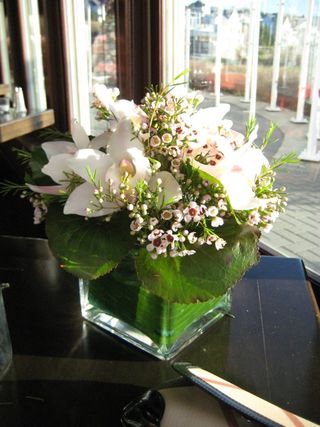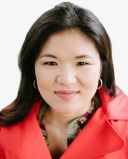Gratitude
The Moment I Knew
How my terminally ill husband taught me about gratitude
Posted January 31, 2016

It's October and pitch black outside. The birds are not even awake, and I'm rumbling through my purse, going to turn on the car, to make sure the seat warmer on the passenger side is on because my husband's frail and skinny body gets cold easily. I'm going through a mental checklist: grab snacks, bottle of water, cash. I go back into the kitchen. My husband Roy is up and ready. I see the clothes are loose fitting, kind of hanging on him, but he still looks healthy in so many ways. I grab his favorite jacket, and we walk downstairs to the car. He mumbles, "Grateful I can still walk short distances like this." I ignore it. I'm more focused on driving to Ann Arbor.
At this time of the morning, there is no traffic. During the car ride, we make small talk. I pull into the University of Michigan Cancer Center parking lot. I remark that I've never seen it so empty. We don't have a handicap sticker yet because the cancer diagnosis happened about 3 weeks ago, and we're still in crisis mode. I park in the closest non-handicap parking spot. Getting out of the car, I notice a cluster of wheelchairs together, like you'd find a bunch of shopping carts all together at the grocery store parking lot. I try to find the best one. I realize they're all in the same condition, and I push it over. Like it is an old habit, we do the transfer from car to wheelchair.
We wonder aloud if we can get into the building this early. No one seems to be around, but we enter. As I push the elevator arrow button, a woman walks towards us, with her husband. He is pushing a wheelchair with an IV station (also on wheels) and a very young bald male child is sitting in it, no hospital gown, reading a book. I notice his backpack is securely fastened to the back of the wheelchair. I don't want to stare, even if we weren't in the Cancer Center, I know I shouldn't give them a second look. I'm not sure where to look. I catch the mom's eyes, and she gives me a glance of understanding. The elevator doors open. I'm uncomfortable so I look away at the dad who's been tasked with managing the IV and pushing his son's wheelchair into the elevator. I tell my husband, "we'll wait." They overhear me and say, "No, there's plenty of room." The mother extends her arm to make sure the doors stay open. Now the five of us ride in this elevator. Silence. We all exit, and I see them wander off in another direction. Now, I'm actually staring because their backs are to me. I wonder, "what type of cancer does this child have, is it treatable, how long have they been coming to the cancer center, what grade is he in?"
I feel my chest slightly tighten with a lump in my throat. I tell Roy, I need to use the bathroom. I push his wheelchair off to the side. I can't get into the bathroom stall fast enough. My heart is racing, and there are tears coming down my face. I'm crying for this family, for this child, complete strangers and yet, it also is giving me permission to cry for Roy and myself. I try the deep breathing. I panic, wondering how long I've been in this stall. I go to the sink, and begin to assess the damage. "Will he be able to tell I'm crying?" I don't recognize this face staring back at me. Then I look at my hair; it's a rat's nest. I wonder, "did I forget to brush it?" I tell myself, "Pull it together. No one is looking at your hair."
I walk out of the bathroom, trying not to make eye contact with Roy, pretending to look for directive signage. He can't see me now because I'm pushing him down the hall, yet, somehow he knows I had a meltdown. He says, "Seeing that little guy reminds me how much we have to be grateful for, doesn't it?" I want to stop the wheelchair and just lay face down somewhere and cry. I can't allow myself that moment here. I need to get him to this appointment. I keep pushing the wheelchair, trying to take deep breaths without being obvious. He repeats, "We have so much to be grateful for, don't we?" This time, the tone is more declarative, using his middle school teacher voice, not really asking a question.
I'm choking back tears, searching for words. I'm actually speechless. Impulsively, I blurt this out, "What do you mean?" Now, I actually stop the wheelchair, pushing it up to a round table, and I sit down. There are more people around, but it still feels like time stopped. I'm thinking about the pain, the disappointment that the cancer diagnosis is terminal, and it feels like my heart is literally breaking open. Roy doesn't miss a beat, and begins to make a list: "Look at this great place we are at. They (the staff) got us in before everyone else this morning, you've really learned how to navigate your way around this place." He grabs my hand and adds, "We have each other."
That was in October 2007, and when I think back to this moment, my eyes still fill with tears. In less then eight weeks, Roy underwent numerous medical procedures, consultations and then we made the decision for hospice. He died at home in November 2007, about eight weeks after the initial adrenal cancer diagnosis.
My life changed because of his death and because of my husband's beautiful acceptance of his death. I co-authored a book, with psychologist James Windell, for other widows. We interviewed over 100 widows of all ages about their experiences. Some widows lost their husbands to suicide, the war, substance abuse, heart attacks and sudden tragic accidents. When I listened to them, I often, couldn't help thinking back to those brutal months in 2007. I felt isolation, even around others, and loneliness aside from grief -- the kind of sorrow widows share. James and I are wrote this book, A Widow's Guide to Healing: Gentle Support & Advice For The First 5 Years, with the hope that when other widows read it they will feel less alone.
Kristin Meekhof is a licensed Master's Level Social Worker. She is a speaker, writer, and the author of "A Widow's Guide to Healing: Gentle Support and Advice For The First 5 Years and honored to have cover blurbs from Maria Shriver and Deepak Chopra, MD.


